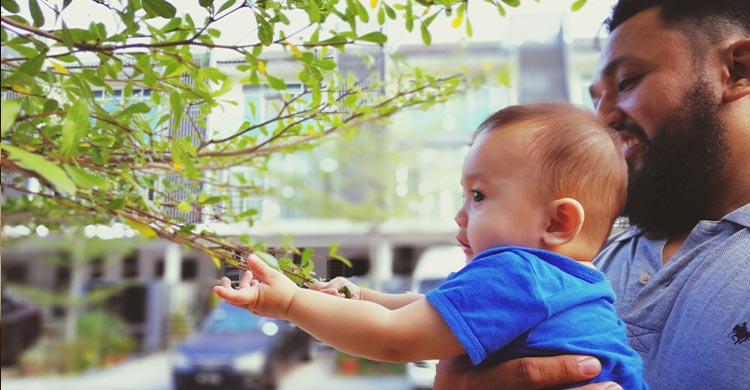When can I take my Newborn Baby Outside?

Are you a new parent willing to know when a newborn can go outside? Experiencing new things and making new memories with your baby is super fun; taking your newborn baby outside with you is one of those experiences. Going on family picnics or playground visits must have been on your bucket list after your baby’s birth. This blog is the complete cheat sheet that will help all the new parents out there plan their first outdoor visit with their newborn baby in the most fitting manner.
When Can a Newborn Go Outside?
After Doctor’s Approval:
When your pediatrician approves, your newborn can go outside. The pediatrician approves after the baby’s first checkup. He will thoroughly check the baby’s health and offer advice about the appropriate outdoor exposure depending on the weather conditions and the baby’s current health status.
New mothers are advised not to take their babies to crowded places like markets and malls because the crowd can make the baby cranky and irritated. Doctors also suggest not taking babies to places where there will be extreme temperatures or direct sunlight. Following your doctor’s guidance for your baby’s specific needs is necessary when taking the newborn outside.
(Also Read, Healthy Mom For Healthy Kids: What Should You Eat During Pregnancy?)
Safety Tips for Taking Newborn Outside
Before taking your newborn outdoors for the first time, follow these safety tips to ensure your little one’s maximum comfort.
Dress the Baby Appropriately
1. Layering the Clothes
New mothers should prioritize comfort and protection when dressing their newborns for the first outdoor experience. Rather than opting for a chunky outfit, dress the baby in different outfit layers to regulate their body temperature. The first base of the baby’s outfit should be soft and light so that the baby does not feel irritated and itchy. Then, mothers can add a warm middle layer and a weather-appropriate outer layer to top it off. A baby’s outdoor clothing should be snug but not constricting. Mothers can add hats or gloves, as needed by their babies, to keep them comfortable.
2. Sun Protection
Newborns are more prone to getting sunburnt easily, and sunburn can cause issues. To ensure maximum sun protection, mothers can use a baby stroller with a canopy. Whenever taking the baby out in direct sunlight, cover them in lightweight full-sleeve clothes with a hat that has wide brims. Layering the baby’s clothes helps adjust them as the temperature changes. Parents should avoid taking the newborn outside in peak sun hours and seek shaded areas for protection.
3. Protection from Elements
To protect your newborn baby from insects and mosquitoes, you can apply mosquito repellent on the clothes that your baby’s pediatrician has prescribed. Rather than applying it directly on your baby’s skin, use it on his clothes, avoiding the area near his face. Avoid wooded or insect-prone regions to ensure your newborn’s maximum safety when taking the newborn outside.
Transportation Considerations for Taking Newborn Baby Outside
1. Car Safety
When taking a newborn outside for the first time, take care of the safety measures in the car. Parents can make the baby sit in a rear-facing car seat, where the baby can easily see you, and buckle them to make them feel comfortable and snuggly. The buckle of the baby’s seat should be buckled securely even when you are traveling for a short period. It will help keep the newborn baby safe from accidents or sudden stops while driving.
2. Stroller Safety
When parents are taking their newborn out on a stroller, the stroller should have proper support and all the required safety measures, like a secure harness and sunshade for the baby. The stroller should also be appropriate for the kid’s age and size. Avoid taking your newborn baby outside on a stroller in crowded places and extreme weather conditions. When taking the newborn outside, it is necessary to keep a keen eye on the baby’s stroller.
(Also Read, How To Hold A Newborn Baby Safely? )
Hygiene Practices
1. Hand Sanitization
When taking a newborn outside, it is necessary to keep sanitizer handy to clean your hands before holding and touching the baby to keep the germs away. This practice will help avoid sickness in your baby. Keeping your hands clean is simple but necessary to keep your little one safe and healthy outdoors.
2. Diaper Changing On the Go
When you are heading outside with your newborn baby, remember to keep their diapers and wipes to maintain their comfort and hygiene. To change your baby’s diaper, choose a flat and clean spot. Make sure that your baby is placed securely during the diaper change. Always dispose of the diaper properly, and don’t forget to wash your hands after changing the baby’s diaper.
Choosing the Right Time for Taking your Newborn Baby Outside

1. Weather Preference
Always choose mild weather when taking your newborn outside because extreme weather conditions like heat and cold can cause health issues in the newborn. Adjust the baby’s clothing according to the weather; always opt for layering.
2. Optimal Timing
Before taking the newborn outside, wait a week and let the baby have their first pediatrician checkup. The appropriate time to take the baby outdoors is early morning or late evening to avoid extreme weather conditions.
Staying Alert when Taking the newborn Outdoors
1. Monitoring Health
When you are taking your baby outdoors with you, it is essential to monitor its health. Parents should check the baby’s breathing, skin color, temperature, and overall behavior to ensure the baby is doing well. If you see any signs of discomfort, fever, or unusual crankiness, contact your doctor immediately.
2. Adjusting Plans
When taking your newborn outside, do not visit crowded places or where there will be direct sunlight. Parents should keep the baby warm and cozy, shielded from the wind. Parents should make sure that the baby is not exposed to sick people. It is okay to adjust plans if the weather changes or the baby feels uncomfortable. Parents can start taking the baby outdoors on short outings, and when the baby gets accustomed to them, they can gradually increase the outing time.
(Also Read, 10 Unique And Healthy Breakfast Ideas For Toddlers)
When Not to Take Newborns Outside
1. Under Certain Health Conditions
- Medical Concerns
In some cases, newborns should avoid outdoor exposure, e.g., respiratory issues like asthma or if the baby has a compromised immune system, where the baby is prone to getting sick quickly. The babies who were delivered premature or the babies who have a congenital heart defect should also avoid going outdoors. If you want to take your newborn outdoors in such health conditions, consult a pediatrician for the proper guidance.
- Air Quality
Parents should not take their newborn outside when they know the air quality is low. Even parents should avoid going outdoors on days of high pollution or foggy days. If you are planning any outdoor activities with your newborn, do not forget to check the air quality indexes and replace those outdoor activities with indoor activities to protect the baby from pollutants that can cause respiratory issues.
2. During Peak Illness Seasons
- Cold and Flu Season
In the cold and flu seasons, doctors advise parents not to take the newborns outdoors because the newborn baby’s immune system is not entirely developed, and they are easily susceptible to illnesses. The crowded places increase the risk of virus exposure for newborns. It is better to keep the baby indoors till the time the risk of outbreak and infection decreases.
- Outbreaks
Whenever there is an outbreak of contagious illnesses like flu or measles, newborn babies should be kept in a safe and sterile environment. Babies have fragile immune systems, and if they are premature infants or have previous health issues, even the most minor diseases can become the reason for life-threatening situations. Until the effect of the outbreak goes away completely, keep the baby indoors and consult a pediatrician, even for the most minor issues.
3. Postpartum Recovery
- Maternal Health
The mother’s postpartum recovery is necessary before the newborn baby’s first outdoor exposure. The mother should take proper rest and require nutrition and hydration to maintain her physical and mental well-being. Factors like pain, bleeding, and mood swings should be considered seriously in deciding whether the mother is ready to take the newborn baby outdoors or not.
- Breastfeeding Establishments
Mothers should breastfeed their newborn babies before taking them outdoors for the baby’s comfort and nutrition. Before the outdoor visit, mothers should ensure the baby is well-fed, hydrated and content, reducing the chances of the baby feeling fussy and hungry during the outdoor time. Breastfeeding also helps provide the baby with antibodies that help the baby’s immune system, which offers protection against infections that the baby might encounter outdoors.
Conclusion
Taking the newborn baby outside for the first time is a very big milestone in every parent’s life. With some careful planning, consideration for their safety, doctor’s approval and hygiene practices, every new parent can create a happy and memorable outdoor experience for them and their baby.



